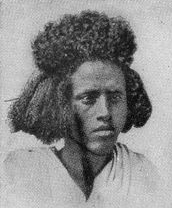|
Fuzzy Wuzzy (other)
Fuzzy-Wuzzy can refer to: * Hadendoa, an East African tribe * '' Fuzzy-Wuzzy'', a poem by Rudyard Kipling * Fuzzy Wuzzy Angels Fuzzy Wuzzy Angels was the name given by Australian Army, Australian soldiers to Papua New Guinean people, Papua New Guinean war carriers who, during World War II, were recruited or forced into service to bring supplies up to the front and carry ..., the name given to Papua New Guineans who assisted injured Australian troops during World War II * Formerly one of the shades of brown Crayola crayon colors {{disambiguation ... [...More Info...] [...Related Items...] OR: [Wikipedia] [Google] [Baidu] |
Hadendoa
Hadendoa (or Hadendowa) is the name of a nomadic subdivision of the Beja people, known for their support of the Mahdiyyah rebellion during the 1880s to 1890s. The area historically inhabited by the Hadendoa lies today in parts of Sudan, Egypt and Eritrea. Etymology According to Roper (1930), the name ''Haɖanɖiwa'' is made up of ''haɖa'' 'lion' and ''(n)ɖiwa'' 'clan'. Other variants are ''Haɖai ɖiwa'', ''Hanɖiwa'' and ''Haɖaatʼar'' (children of lioness). Language The language of the Hadendoa is a dialect of Bedawi. History The southern Beja were part of the Christian kingdom of Axum during the sixth to fourteenth centuries. In the fifteenth century, Axum fell to the Islamization of the Sudan region, and although the Beja were never entirely subjugated, they were absorbed into Islam via marriages and trade contracts. In the seventeenth century, some of the Beja expanded southward, conquering better pastures. These became the Hadendoa, who by the eighteenth century we ... [...More Info...] [...Related Items...] OR: [Wikipedia] [Google] [Baidu] |
Fuzzy-Wuzzy
"Fuzzy-Wuzzy" is a poem by the English author and poet Rudyard Kipling, published in 1892 as part of '' Barrack Room Ballads''. It describes the respect of the ordinary British soldier for the bravery of the Hadendoa warriors who fought the British army in the Sudan and Eritrea. Background "Fuzzy-Wuzzy" was the term used by British soldiers for Beja warriors who were supporting the Mahdi of Sudan in the Mahdist War. The term relates to the elaborate ''tiffa'' hair style favoured by the Hadendoa tribe, a subdivision of the Beja people. The Beja people were one of several broad multi-tribal groupings supporting the Mahdi, and were divided into six tribes: Hadendoa, Halanga, Amarar, Beni-Amer, Habab, and Bishariyyin. All of these are semi-nomadic and inhabit the Sudan's Red Sea Hills, Libyan Desert, and southern Egypt. The Beja provided a large number of warriors to the Mahdist forces. They were armed with swords and spears and some of them carried breech-loaded rifles whi ... [...More Info...] [...Related Items...] OR: [Wikipedia] [Google] [Baidu] |
Fuzzy Wuzzy Angels
Fuzzy Wuzzy Angels was the name given by Australian Army, Australian soldiers to Papua New Guinean people, Papua New Guinean war carriers who, during World War II, were recruited or forced into service to bring supplies up to the front and carry injured Australian troops down the Kokoda trail during the Kokoda Campaign. "Fuzzy-Wuzzy" was originally used by British Army, British soldiers in the 19th century as a name for Hadendoa warriors on the Red Sea coast of the Sudan, and referred to their elaborate butter-matted hairstyles. History In 1942, during the Pacific invasion, the Japanese people, Japanese had built up a force of 13,500 in the Gona, Papua New Guinea, Gona region of Papua with the intention of invading Port Moresby. The key to the offensive was an overland trail across the Owen Stanley Ranges. The trail ranged from the small village of Buna on the north coast of Papua (Australian territory), Papua and went up the slopes through Gorari and Oivi to Kokoda. The trail wa ... [...More Info...] [...Related Items...] OR: [Wikipedia] [Google] [Baidu] |


